Clean Energy Is for Everybody, NREL Says
Black Employee Resource Group Seeks To Make It So Through Community Outreach and Engagement
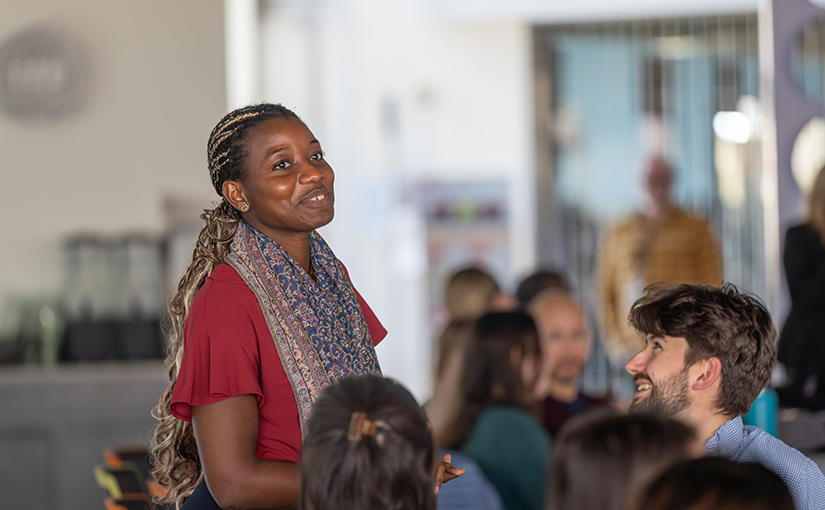
Kamyria Coney has always had a “huge passion for clean air” and a love for the environment. So you might think she would naturally leap at a career as a researcher working on clean energy solutions designed to help clean up our atmosphere.
It is not a bad guess. But there is one problem: It is hard to pursue a career you have never heard of.
Black workers make up just 8% of the U.S. clean energy sector. And Coney is part of that small percentage. At the National Renewable Energy Laboratory (NREL), she works with communities across the United States and beyond to help make clean energy and clean air accessible to more people everywhere. But even though she discovered a path to pursue her passion, she knows not all Black students do. That is why, as a cochair for NREL’s Black Employee Resource Group (ERG), Coney is working to inspire Black students of all levels to consider a career in clean energy.
It is a goal that aligns with the laboratory’s core values and strategic road map. To achieve the nation’s ambitious clean energy goals and transition to a clean energy economy everyone can participate in and benefit from, the laboratory needs a deep bench of diverse voices and perspectives. One way it seeks to increase representation of Black voices is through community outreach and engagement.
Two recent events cosponsored by NREL’s Global Accessibility and Belonging (GA&B) Office and the Black ERG illustrate the intentionality and impact of those efforts. One took place on NREL’s campus and the other at a Denver Public School. Both involved exclusive screenings of the recently released Disney National Geographic documentary film "The Space Race."
Disney Gets Real at NREL—Film Unearths Buried History
As NREL GA&B Officer Arron Gregory introduced guest speaker Stephen Leach, director of Inclusive Content and Engagement for National Geographic at Disney Entertainment, he encouraged the audience at NREL to ask questions.
“The harder the questions the better,” he said. Flipping the script, Leach tossed out a hard question of his own: “When was the first time you saw yourself represented on television?
“The reality is, there are many communities out there that do not see themselves represented authentically on television,” Leach said. He challenged the audience to think about how seeing or not seeing scientists, doctors, lawyers, or engineers who looked like them might have subconsciously broadened or narrowed their career pathways.
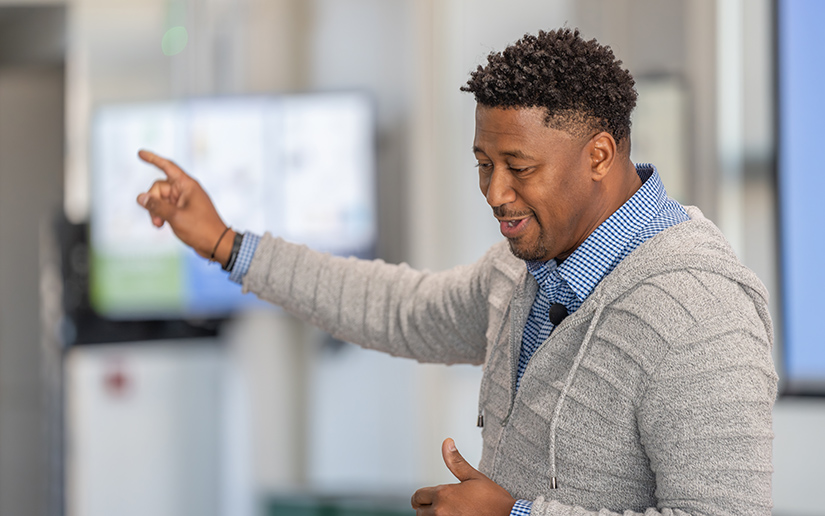
In entertainment, as in science, that is a long-standing problem his team at National Geographic is tasked with confronting head on. Their job is to use the power of inclusive storytelling to amplify underrepresented voices and untold stories authentically and appropriately—and make sure the stories reflect their diverse global audience. "The Space Race" delivers on multiple levels.
"The Space Race" shines a light on the insidious, systemic racial bias that scuttled Engineer and U.S. Air Force Officer Ed Dwight’s opportunity to log time in outer space as America’s first Black astronaut and how his contributions to the space program were lost to history for six decades.
The film highlights the profound societal contributions, scientific and creative legacy, and indomitable spirit of Dwight, who is now flourishing in his 90s as a nationally acclaimed sculptor. It also tells the story of America’s “Afronauts” who eventually followed in trailblazer Dwight’s footsteps.
At the same time, it examines the power of representation through the lens of the systemic injustice that not only derailed Dwight’s career as an astronaut but also dampened the dreams of generations of Black youth.
On-Campus Screening Elicits Questions and Emotion
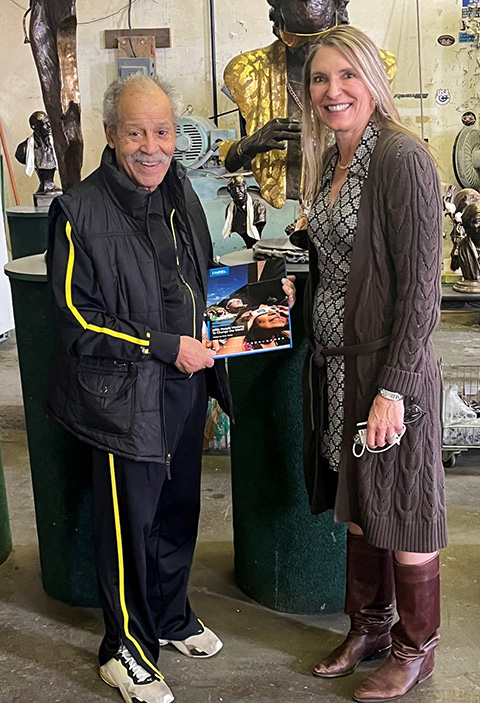
After the screening, Leach invited the audience to share their thoughts and questions.
Sika Gadzanku, Coney’s counterpart leading the Black ERG, was the first to share. “I remember watching 'Hidden Figures' and thought that history was so powerful, and so it’s great to get to learn more about actual history. [The astronauts] have very compelling stories, and it’s quite sad that … I’m only now hearing about [them].”
Another audience member asked about channeling emotion into action, specifically around education. “What can we do to find the kids that have the aptitude and the desire and give them the opportunity to get the education they need to move things like this forward here at NREL?”
Leach said intentionality is the key. “If you can be intentional and deliberate about your actions and what you’re doing as it relates to this, that’s how you're going to see change. It’s not going to happen by happenstance.”
NREL Crew Makes a Splash at Dora Moore ECE-8 School
“I think what we did yesterday was intentional and deliberate and made an impact,” Gregory said, recalling Feb. 28, when he, along with Leach, NREL Human Resources staff, and Black ERG members, ventured to Dora Moore ECE-8 School in Denver’s Capitol Hill neighborhood.
After sharing clips of "The Space Race" at Dora Moore, the NREL crew shared openly with the students about the passions, pitfalls, and accomplishments that influenced their career paths. The students peppered the presenters with questions about their careers, their fears, challenges they faced, and upcoming Disney films.
“Kids are the best,” Gadzanku said. “They’re curious, and they have no filter.”
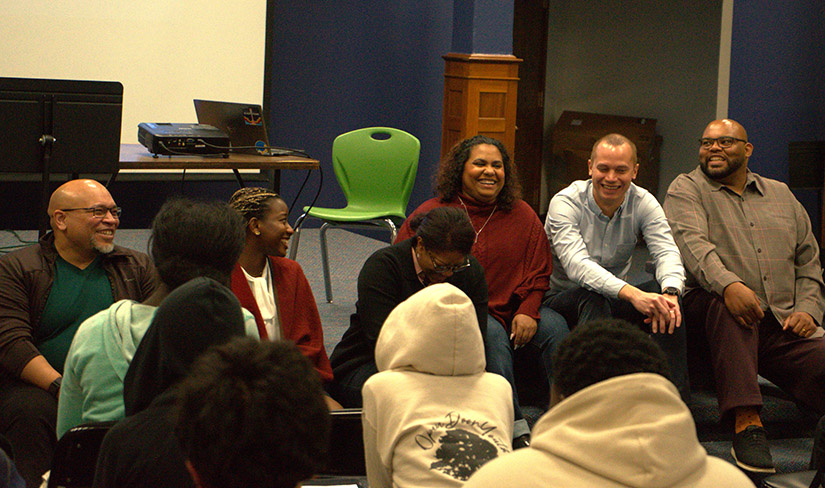
Assistant Principal Jillian Watson said her students were fully engaged. “We have a school that is 70% students of color,” Watson said. “And like most Denver Public Schools, our staff is probably 70% white. And it’s just super important for our kids to see themselves in adults in different careers.”
Watson recalled Administrative Associate Akiba Nelson from NREL’s Workforce Development Group saying she started as a janitor at NREL. “Akiba said interviewing was really hard for her. She said, ‘I didn't believe in myself, and I needed to believe in myself and who I was so I could present myself in an interview.’”
Watson appreciated the various career pathways the NREL group represented. “A lot of them were not actually scientists. We had a lawyer, someone who worked in the education side, someone in HR. Our students are really interested in seeing successful adults in a variety of roles where they might not have seen someone who looks like them,” she said.
A Course Change Leads to NREL
For GA&B Officer Gregory, who served as the chief diversity, equity, and inclusion officer for several school systems back east before joining NREL in 2023, the event at Dora Moore was a full-circle moment. In education, he experienced firsthand how lack of representation affects students of color.
“What can you do about this curriculum,” one student challenged. “Because I don’t see myself in it. I’ve never seen Moby Dick in my neighborhood. I’ve never seen engineers that look like me.”
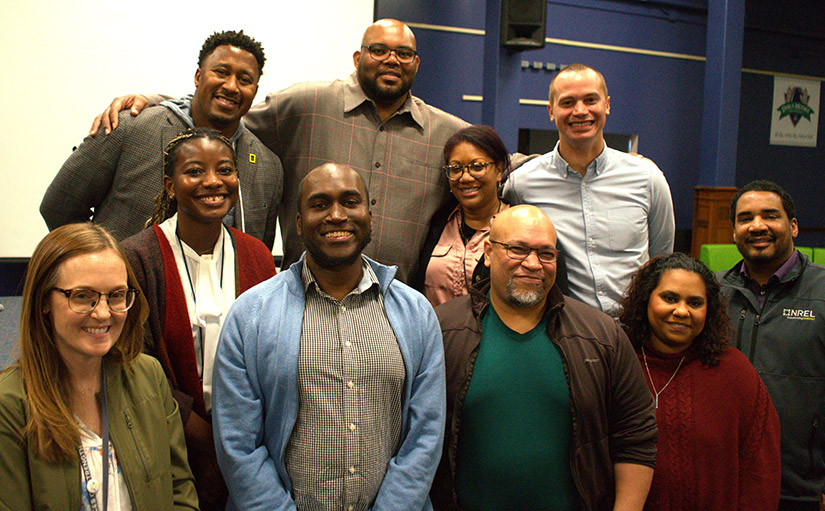
Gregory could not deny the truth in the student’s words. “It didn’t reflect him. It didn’t talk about him historically. There was no messaging about who he was.” That hard reality led Gregory on a personal mission to explore solutions in various spheres outside education, and he eventually landed at NREL.
After transitioning from leading teams auditing school curricula to being a strategic partner in developing curricula, Gregory began examining the role organizational culture plays in challenges around diversity. He started thinking about ways he might leverage his experience in education to increase diversity within an organization. That is when the opportunity to lead NREL’s GA&B Office presented itself.
NREL’s vision, mission, and “walk the talk” ethos resonated with Gregory. “One of the things that I've been messaging around the office is that DEIA isn’t what we do; it’s what we achieve,” he said. “We have to do something to actively ensure that we have diversity, equity, inclusion, and accessibility.”
One of the first things he did in his role was help lead and shape NREL’s 10 ERGs, applying a “Four Cs” framework: culture, career, company, and community. The on-campus screening of "The Space Race" and the visit to Dora Moore touched on each pillar.
“If you can be intentional and deliberate about your actions and what you’re doing ... that’s how you're going to see change. It’s not going to happen by happenstance.”
— Stephen Leach, director of Inclusive Content and Engagement for National Geographic
at Disney Entertainment
Black ERG Lays in a Course for an Inclusive Energy Future
"The Space Race" events at the laboratory and Dora Moore ECE-8 were part of the Black ERG’s Black History Month celebration. But the intentionality that brought them to fruition transcends specific holidays or months.
The Black ERG works throughout the year to engage NREL staff and people in the Denver Metro community and to serve as ambassadors for diversity, energy justice, and a clean energy future for the world. “We’re trying to align those four pillars with our focus, which is recruitment, retention, and community engagement,” Cochair Gadzanku said about outreach activities like "The Space Race."
“I think it put into perspective our work at NREL in centering and forwarding equity and energy justice,” said NREL Researcher Gokul Paranjothi, Global ERG chair and member of the Asian ERG. “There’s an avenue for a lot of other communities to benefit.”
“For me personally it just brought in some of that extra passion,” Cochair Coney said about the group’s community engagement activities, including a 2023 event at the Aurora Mall and a mixer on Feb. 20 with the American Association of Blacks in Energy. “I think it does make a huge impact.”
Gadzanku, who recently represented NREL at the National Society of Black Engineers Convention in Atlanta, Georgia, concurred. She pointed to the near-term opportunities for retention and recruitment, as well as the “more long-term engagement that might pay dividends down the line.”
Both Coney and Gadzanku said the connections they have made through the Black ERG have been a highlight of their five years at the laboratory.
“It’s been one of the best parts of being at NREL,” Gadzanku said. “It’s a way that we can have that internal community as a lab but also think about how do we support broader recruitment efforts [and] get people to have a sense of belonging, because that can usually make or break an experience at a job.”
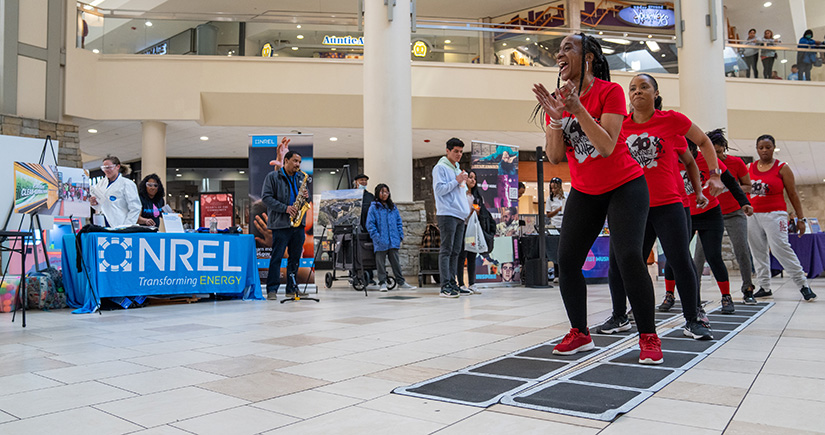
Representation Matters
As Leach wrapped up the “Space Race” presentation at NREL, he challenged the Black ERG to build on the experience at Dora Moore.
“Representation matters,” he reiterated. “I’m a firm believer: If you see it, you can be it. So, for them to see your faces, and to see folks that are doing this type of work, it’s such a powerful thing. It is such a vital piece to make sure we’re doing our part for the next generation.”
On the flip side, the Black ERG’s community engagement efforts are helping NREL see what it wants to be. Gregory views the work as foundational to the awareness, perspective, diversity—and sense of accessibility and belonging—needed to realize the laboratory’s vision.
“How can we build our own cultural awareness and cultural competency of understanding those that are different from us?” he asked. “As an institution, we need to look beyond what we see. We have to be intentional about diversity, intentional about hiring. And ask the tough questions.”
Discover what it is like to work at NREL.

